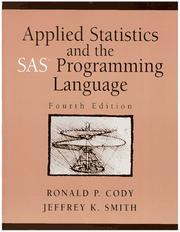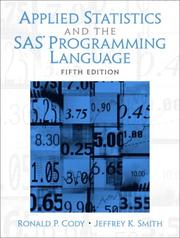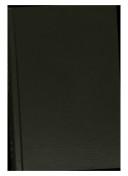| Listing 1 - 9 of 9 |
Sort by
|
Book
ISBN: 9780759122949 9780759122956 Year: 2014 Publisher: Lanham (Md.) : Rowman and Littlefield,
Abstract | Keywords | Export | Availability | Bookmark
 Loading...
Loading...Choose an application
- Reference Manager
- EndNote
- RefWorks (Direct export to RefWorks)
Arts and society. --- Community life. --- Education --- Libraries and community. --- Libraries and education. --- Libraries --- Museums and community. --- Museums --- Social aspects. --- Educational aspects.

ISBN: 0137436424 9780137436422 Year: 1997 Publisher: Upper Saddle River, N.J. Prentice-Hall
Abstract | Keywords | Export | Availability | Bookmark
 Loading...
Loading...Choose an application
- Reference Manager
- EndNote
- RefWorks (Direct export to RefWorks)
Programming --- Mathematical statistics --- SAS (Computer system) --- Data processing --- 681.3*G3 --- #SBIB:303H4 --- Probability and statistics: probabilistic algorithms (including Monte Carlo);random number generation; statistical computing; statistical software (Mathematics of computing) --- Informatica in de sociale wetenschappen --- 681.3*G3 Probability and statistics: probabilistic algorithms (including Monte Carlo);random number generation; statistical computing; statistical software (Mathematics of computing) --- SAS (Computer file) --- Statistical analysis system --- SAS system --- Mathematical statistics - Data processing

ISBN: 0131465325 9780131465329 Year: 2006 Publisher: Upper Saddle River, N.J. : Pearson Prentice Hall,
Abstract | Keywords | Export | Availability | Bookmark
 Loading...
Loading...Choose an application
- Reference Manager
- EndNote
- RefWorks (Direct export to RefWorks)
Programming --- Mathematical statistics --- SAS (Computer system) --- Data processing --- Data processing. --- SAS (Computer file) --- 681.3*G3 --- Probability and statistics: probabilistic algorithms (including Monte Carlo);random number generation; statistical computing; statistical software (Mathematics of computing) --- 681.3*G3 Probability and statistics: probabilistic algorithms (including Monte Carlo);random number generation; statistical computing; statistical software (Mathematics of computing) --- Statistical analysis system --- SAS system --- Mathematical statistics - Data processing
Book
ISBN: 9781139207058 9781107026285 1107026288 1108402674 1316121208 1316120112 1139207059 Year: 2014 Publisher: Cambridge Cambridge University Press
Abstract | Keywords | Export | Availability | Bookmark
 Loading...
Loading...Choose an application
- Reference Manager
- EndNote
- RefWorks (Direct export to RefWorks)
The psychology of aesthetics and the arts is dedicated to the study of our experiences of the visual arts, music, literature, film, performances, architecture and design; our experiences of beauty and ugliness; our preferences and dislikes; and our everyday perceptions of things in our world. The Cambridge Handbook of the Psychology of Aesthetics and the Arts is a foundational volume presenting an overview of the key concepts and theories of the discipline where readers can learn about the questions that are being asked and become acquainted with the perspectives and methodologies used to address them. The psychology of aesthetics and the arts is one of the oldest areas of psychology but it is also one of the fastest growing and most exciting areas. This is a comprehensive and authoritative handbook featuring essays from some of the most respected scholars in the field.
kunst --- kunsttheorie --- esthetica --- kunst en psychologie --- kunstonderwijs --- muziek --- dans --- theater --- architectuurtheorie --- architectuur --- waarneming --- perceptie --- naslagwerk --- 7.01 --- 159.9 --- psychologie --- Aesthetics --- Arts --- Radio broadcasting Aesthetics --- Psychological aspects.
Book
ISBN: 1316832139 1316846016 1316843777 1107179394 1316631311 Year: 2018 Publisher: Cambridge : Cambridge University Press,
Abstract | Keywords | Export | Availability | Bookmark
 Loading...
Loading...Choose an application
- Reference Manager
- EndNote
- RefWorks (Direct export to RefWorks)
This book brings together leading scholars from around the world to provide their most influential thinking on instructional feedback. The chapters range from academic, in-depth reviews of the research on instructional feedback to a case study on how feedback altered the life-course of one author. Furthermore, it features critical subject areas - including mathematics, science, music, and even animal training - and focuses on working at various developmental levels of learners. The affective, non-cognitive aspects of feedback are also targeted; such as how learners react emotionally to receiving feedback. The exploration of the theoretical underpinnings of how feedback changes the course of instruction leads to practical advice on how to give such feedback effectively in a variety of diverse contexts. Anyone interested in researching instructional feedback, or providing it in their class or course, will discover why, when, and where instructional feedback is effective and how best to provide it.
Feedback (Psychology) --- Communication in education. --- Education --- Learning, Psychology of --- Reinforcement (Psychology)

ISBN: 013500554X Year: 1991 Publisher: Englewood Cliffs (N.J.): Prentice Hall
Abstract | Keywords | Export | Availability | Bookmark
 Loading...
Loading...Choose an application
- Reference Manager
- EndNote
- RefWorks (Direct export to RefWorks)
Book
ISBN: 9781107179394 9781316631317 Year: 2018 Publisher: Cambridge Cambridge University Press
Abstract | Keywords | Export | Availability | Bookmark
 Loading...
Loading...Choose an application
- Reference Manager
- EndNote
- RefWorks (Direct export to RefWorks)
"'Feedback, like rain, should be gentle enough to nourish a person's growth without destroying the roots.' This quote (modified from the original by Frank A. Clark) is a simple reminder that feedback can be helpful or not, assume a variety of forms, be provided at different times, and have diverse effects on different people. But what if there were a drought (no rain, no feedback)? Consider the following two questions: If a tree falls in the woods and nobody's around to hear it--does it make a noise? If a teacher instructs some content or skill and doesn't assess and support learning--can students deeply learn? In both cases, the answer is no. So feedback is really important--not just for learning new things, but pretty much across all of life. There are countless examples of feedback in nature--with both positive and negative functions. For example, our hypothalamus reacts to changes in temperature and responds appropriately. If the temperature drops, we shiver to bring up the temperature; and if it's too hot, we sweat to cool down via evaporation. Predator-prey relations in nature are also well-known examples of feedback loops, as is climate change. The key difference between positive and negative feedback is their response to change--positive feedback enlarges change while negative feedback reduces change"--
Multi
ISBN: 9781316832134 9781107179394 9781316631317 Year: 2018 Publisher: Cambridge Cambridge University Press
Abstract | Keywords | Export | Availability | Bookmark
 Loading...
Loading...Choose an application
- Reference Manager
- EndNote
- RefWorks (Direct export to RefWorks)
Digital
ISBN: 9781139207058 Year: 2014 Publisher: Cambridge Cambridge University Press
Abstract | Keywords | Export | Availability | Bookmark
 Loading...
Loading...Choose an application
- Reference Manager
- EndNote
- RefWorks (Direct export to RefWorks)
Psychology --- Aesthetics --- Art
| Listing 1 - 9 of 9 |
Sort by
|

 Search
Search Feedback
Feedback About UniCat
About UniCat  Help
Help News
News